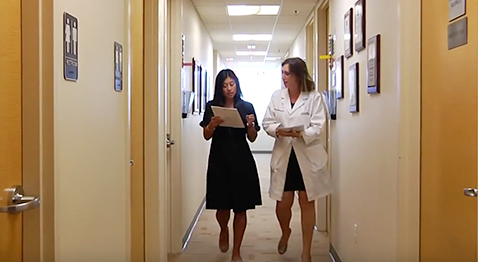Understanding the Causes of Infertility
A key step to overcoming any medical problem is to understand what causes it. Recognizing how the body works under normal conditions and being able to identify what is going wrong allows us to address the problem at its source, making treatment more effective.

We also find that understanding the causes of infertility helps patients at our Fort Lauderdale-area practice in Southeast Florida cope with the obstacles they face and maintain a more positive outlook throughout the fertility treatment process.
In order for pregnancy to occur, a precise sequence of events must take place. An egg must mature and be released from the ovary. Healthy sperm must be produced and delivered into the female reproductive system. One sperm cell must meet and fertilize the egg. The resulting embryo must move into the uterus and become implanted in the endometrium. Once implanted, the embryo must continue to grow and develop normally. An interruption in one or more of these key processes can result in infertility. At IVF FLORIDA Reproductive Associates, our job is to determine the cause or causes of infertility so that we can either correct or bypass the problem.
Causes of Infertility
The Egg
Causes of infertility that relate to the egg include irregular or ceased ovulation, low ovarian reserve, and poor egg quality. These are most common in women over 35, but can potentially be a problem in younger women as well. If there is an adequate supply of eggs but the body's endocrine system fails to properly regulate ovulation, fertility medications can be used to trigger the maturation and release of eggs. If this is unsuccessful, IVF may also be an option.
For women who have low ovarian reserve or who release eggs that do not fertilize or develop properly, IVF with egg donation allows for a woman to become pregnant, give birth, and even breastfeed her child, despite not being able to produce viable eggs of her own.
The Sperm
Because they are relatively easy to identify, sperm problems are usually among the first causes of infertility to be tested for in new patients. Low concentration, motility, or morphology of sperm can be attributed to environmental factors, testicular malfunction, a hormonal imbalance, or other problems. It is also common for a physical barrier of some kind to prevent sperm from moving normally through the male reproductive tract. However, in vitro fertilization (IVF), either alone or with intracytoplasmic sperm injection (ICSI) or testicular epididymal sperm aspiration (TESA), is a highly effective treatment option for overcoming most types of male infertility.
Conception
The most common obstacle to conception is timing. The egg is only available for fertilization for about two out of every 21 to 35 days. Although not technically counted among the causes of infertility, difficulty pinpointing the time of ovulation is certainly a problem that many couples encounter when trying to conceive.
However, even when the timing is perfect, there are other factors that may prevent the sperm and egg from successfully coming together. Blockages in the fallopian tubes, hostile cervical mucus, and anti-sperm antibodies all have the potential to interfere with conception. In some cases, such causes of infertility can be treated at our Southeast Florida clinics with surgery or other treatments. If these are unsuccessful, in vitro fertilization (IVF) is an ideal option, because it allows conception to take place outside of the body, in a controlled laboratory setting.
Implantation and Development
Even if conception takes place, pregnancy will not occur unless the embryo is able to implant in the uterine lining and continue to develop. Of all of the stages involved in the establishment of a pregnancy, implantation is the most difficult to manipulate. Certain causes of infertility, such as uterine fibroids or scarring, may be treatable through surgical means, improving the conditions for implantation. However, when implantation consistently fails, despite the absence of any treatable condition, patients may want to consider undergoing IVF with a gestational carrier.
Secondary Infertility
People who have had at least one child without problems but are now struggling to conceive have secondary infertility. Although frequently age-related, secondary infertility can be caused by any problem or condition that develops after the first child or children are born.
The testing and treatment procedures for secondary infertility are similar to those of primary infertility. The emotional issues that accompany this type of problem, however, are unique. Couples are often caught off guard when they have trouble conceiving after having had a child before. They may also receive less support from friends and family members who feel that the child or children they already have should be enough. Many do not even seek treatment because they believe that infertility is something that only childless couples suffer.
At IVF FLORIDA Reproductive Associates, we encourage patients who encounter secondary infertility to seek the treatment and support that they need. Already having one or more children should not exclude patients from having another child if they so desire.
Unexplained Infertility
When no specific causes of infertility can be identified, a couple is diagnosed with unexplained infertility. This can be a frustrating diagnosis, because it deprives the couple of the understanding and sense of control that an identifiable problem offers.
Just because infertility is unexplained, however, does not mean that it is untreatable. The most common course of action is to begin with a minimally invasive treatment option, such as ovulation induction, and progress toward in vitro fertilization (IVF) and other advanced techniques if the initial attempts are unsuccessful.
Contact Our Southeast Florida Infertility Practice, near Fort Lauderdale
If you would like to learn more about the causes of infertility, contact our Southeast Florida specialists in the Miami / Fort Lauderdale area. We will be happy to answer any questions you have or help you schedule a consultation.







